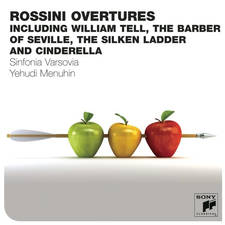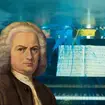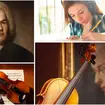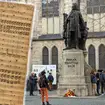Bach's biography: success in Leipzig (1723 - 1744)
After finding his feet in Leipzig, Bach made the most of his responsibilities in church to compose a huge amount of sacred music - as well as writing secular music for the Collegium Musicum.
Bach moved to Leipzig in 1723, and was appointed as Cantor of the Thomasschule at Thomaskirche in Leipzig, Director of Music in the principal churches in the town, the Nikolaikirche and the Paulinerkirche. During this period, he took it upon himself to write a sacred cantata for every Sunday service, and other holidays throughout the church year. This was music which for Bach reflected the Glory of God: prompting him to sign each of the manuscripts S.D.G. (Soli Deo Gloria), translated as to the Glory of God Alone.
As well as his cantatas, Bach devoted a lot of his time to composing his large choral works during his early years in Leipzig. It's fair to say he made an entrance with his famous Magnificat (BWV 243a), first performed in the Thomaskirche on Christmas Day 1723, closely followed by the St John Passion on 26 February 1724, and the St Matthew Passion three years later in April 1727.
His church music was flourishing, but Bach also used his Leipzig years to make the most of his secular performance opportunities. He took over the directorship of the Collegium Musicum, a music group founded by Georg Telemann, whose members regularly performed in the Café Zimmermann, a coffee house off the main square. Many of Bach's works during the 1730s and 1740s were written for this purpose, including parts of his keyboard work the Clavier-Übung, as well as a number of violin and harpsichord concertos. He remained director here until 1741.
In 1733, Bach composed two movements, a Kyrie and Gloria, which later became part of his epic choral work, the Mass in B minor. He presented the manuscript to the King of Poland, Grand Duke of Lithuania and the Elector of Saxony, August III. This mammoth compositional effort was matched with the composition of his well-known Christmas Oratorio the following year.
Aside from his compositional responsibilities, Bach continued to perform on the organ, travelling to Dresden, Altenburg, Halle, and Berlin to give recitals and visit his family. He also used his extensive knowledge of organ restoration, examining the organ at the Marienkirche, Mülhausen, and offering advice on refurbishments. His children, too, started to take on more musical responsibilities - Johann Gottfried Bernard became an organist, and Carl Philipp Emanuel became the harpsichordist to the crown prince Frederick of Prussia.


























